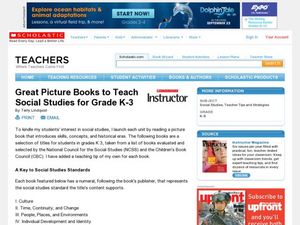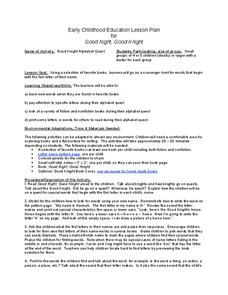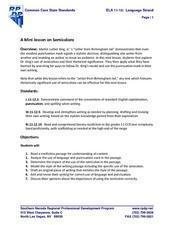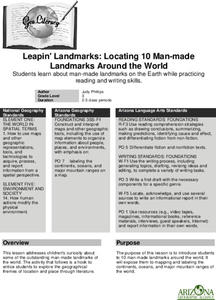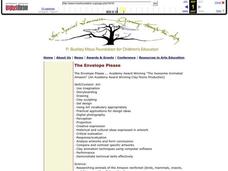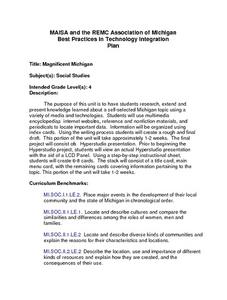Curated OER
Greed is Good?
From Mr. Merdle to Mr. Madoff? A viewing of the PBS adaptation of Charles Dickens’ “Little Dorrit” launches an examination of greedy characters in literature and a study of greed, unfairness, and economic hardship today. The richly...
Curated OER
Monster Plants Storia Teaching Guide
Who wouldn't want to read a book about monster plants? Get those kids into informational texts with an engaging topic, like meat eating plants! You'll use the teaching guide to provide structured practice as your class reads to...
Prestwick House
Understanding Language: Slant, Spin, and Bias in the News
We live in a time of fake news, alternative realities, and media bias. What could be more timely than an activity that asks class members to research how different sources report the same topic in the news?
Curated OER
Great Picture Books to Teach Social Studies for Grade K-3
Every class enjoys reading new books at the beginning of a unit. Use this resource to identify a variety of books for kindergarten to third grade that can be used to complement social studies standards. The books can kindle learners'...
Curated OER
Looking for Trouble - Using the Internet to Research Structured Controversy
Discuss controversial issues with your charges. More importantly, discuss how you have to research both sides of a controversy before taking a stance. In groups, middle schoolers research the controversial issue of dog sled racing. They...
Curated OER
"O Captain! My Captain!"
Who was Walt Whitman, and what link does he have to president Abraham Lincoln? After Lincoln's assassination, Whitman wrote "O Captain! My Captain!" This poem and "When Lilacs Last in the Dooryard Bloom'd" are the focus of...
Penn State
Early Childhood Education Lesson Plan for Good Night, Good Knight
The book Good Night, Good Knight is the inspiration for this plan. Learners get into small groups to search for words in books that begin with their names and fill out and illustrate their own personal letter and name pages.
Southern Nevada Regional Professional Development Program
A Mini lesson on Semicolons
Dr. Martin Luther King, Jr.'s "Letter from Birmingham Jail" serves as an exemplar for a mini-lesson on semicolons. Working alone or in small groups, class members first circle all the semicolons in the letter, and then consider how this...
Curated OER
Leapin' Landmarks: Locating 10 man-made landmarks around the world
Third graders engage in a lesson which addresses their curiosity about some of the outstanding people-made landmarks of the world. They explore the geographical themes of location and place through literature.
Curated OER
Figurative and literal language through the study of Shakespeare
Sixth graders explore figurative and literal language. They study literary devices through short pieces of Shakespeare's work. Then investigate Shakespeare's works and life.
Curated OER
Introducing Biographies - Getting to Know You
Students explore several different types of biographies to determine their area of interest, choose one notable person they would like to explore, complete online tutorial on biographies, and use written and Internet resources to...
Southern Nevada Regional Professional Development Program
Was Bias A Factor? Make an Argument
The ability to analyze an argument is a skill emphasized by the Common Core standards. Offer your class an opportunity to develop and hone their skills by providing them the testimonies in an Oregon court case. After reading the facts of...
Curated OER
Bud, Not Buddy: List-Group-Label Vocabulary Strategy
Readers of Bud, Not Buddy demonstrate their knowledge of the Great Depression with a list, group, label vocabulary strategy. Included are complete directions for the activity that will also introduce class members to the new vocabulary...
PBS
Copyright and Fair Use
When is using someone else's copyrighted material appropriate? Learn about copyright and fair use with a lesson from PBS.org. Scholars read through a reference sheet about authors' rights and users' rights, and then create posters...
Curated OER
Where Do We Begin?
Primary learners grasp sequence of events by discussing morning routines and reviewing the story of Little Red Riding Hood. They explore the necessity of correct order of events. As a class, create a story with a beginning, middle, and...
Curated OER
Spider Watching
Spiders are creepy, crawly - and interesting! Young entomologists learn about parts of a spider's body, their habitats, ways spiders catch their prey, and what they most like to eat. Some excellent art activities are included in the plan...
Curated OER
The Envelope Please
Students research an animal of the rainforest. They create a computerized claymation to present their research.
Curated OER
Christopher Columbus: The Man, the Myth, the Legend
Learn more about maps by examining Christopher Columbus's voyage to the New World. Kindergartners will learn about basic map skills and how to identify the compass rose, oceans, and land masses. They will also discover the purpose of...
Curated OER
Under the Sea - KWL Chart
Students create a KWL chart to start the discussion on ocean animals. They practice sorting the animals into their different classifications. They use indexes, table of contents and glossary to find information.
Curated OER
William Apess and the Mashpee "Revolt" of 1833
Prompt your class with the following question: What was the status of American Indians in Massachusetts during Jackson's presidency? To answer this question, class members will read a series of primary source documents (attached),...
Curated OER
Magnificent Michigan
Fourth graders complete a research project about the state of Michigan. They conduct Internet research, organize the information on index cards, and create a HyperStudio presentation.
Curated OER
Can You Build a Better Mousetrap?
Learners use a variety of linked sites to research information about student inventions and contests that are available for them. They research an invention they would like to see become available. They communicate their results to their...
Curated OER
Exploring Arizona's Biotic Communities Lesson 1: Mapping Biotic Communities
As part of a unit on Arizona's biotic communities, young ecology learners create a map. They describe how humans and animals adapt in their habitat. They take notes and create graphic organizers from articles they read. Beautiful maps,...
DeKalb County Schools
Compare/Contrast
A series of reading activities is sure to engage your young readers! Based on comparing and contrasting ideas, the packet provides opportunities to compare characters, themes, texts, and other elements of fiction.
Other popular searches
- Nonfiction Writing
- Nonfiction Writing Technique
- Nonfiction Summary Writing
- Nonfiction Writing Rubrics
- Narrative Nonfiction Writing
- Leads in Nonfiction Writing
- Creative Nonfiction Writing
- Editing Nonfiction Writing
- Nonfiction Writing Lessons
- Types on Nonfiction Writing
- Nonfiction Research Writing
- Writing a Nonfiction Summary



